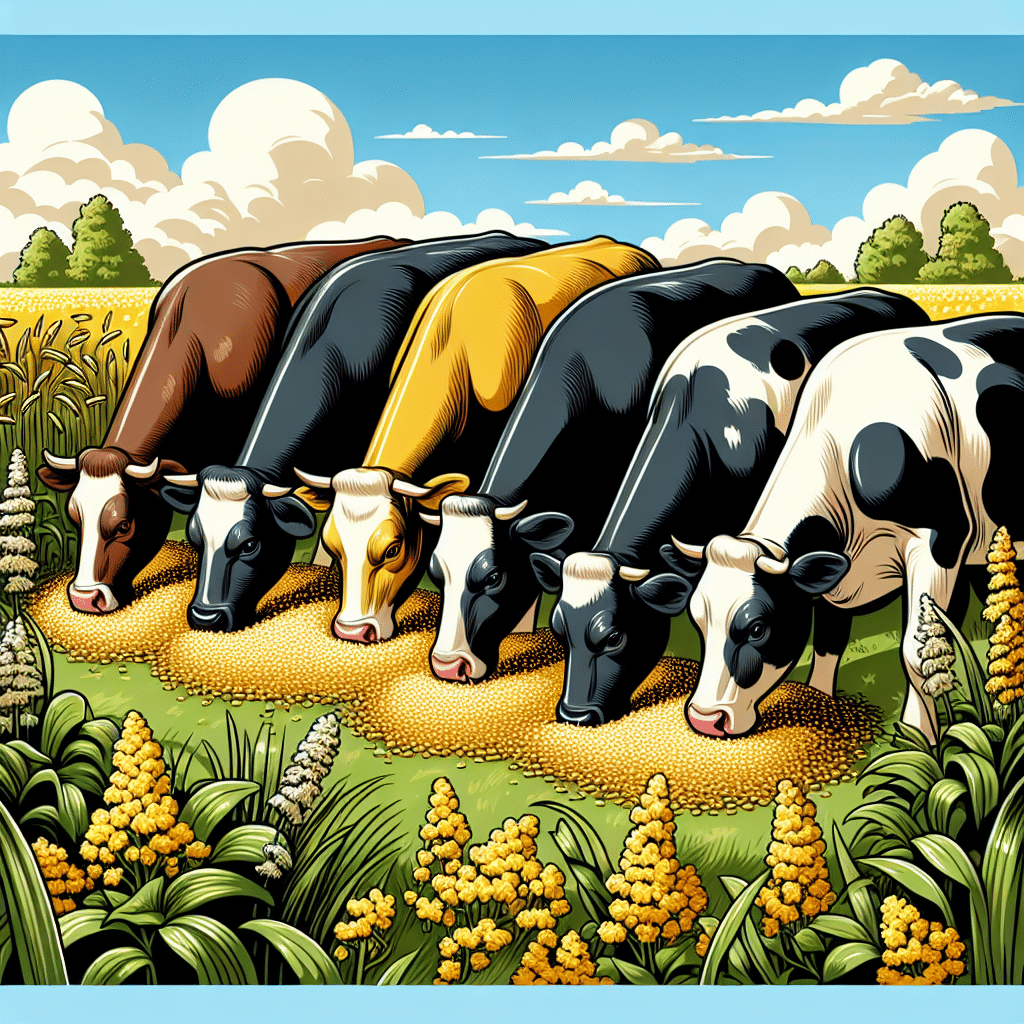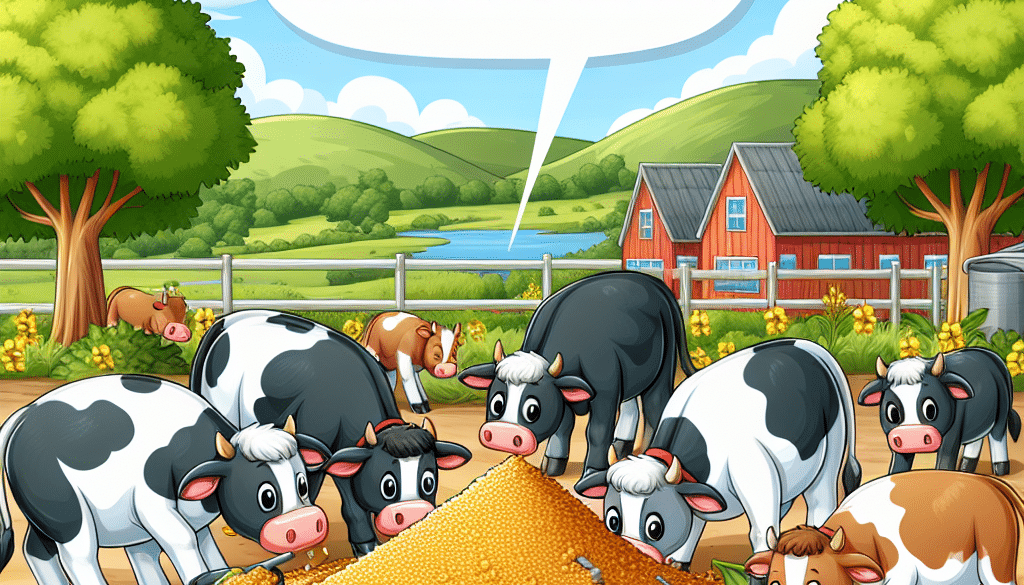Do Cows Eat Canola Meal?
-
Table of Contents
- Canola Meal as a Nutritious Feed Option for Cows
- Understanding Canola Meal and Its Nutritional Profile
- Benefits of Canola Meal in Cattle Diets
- Comparative Advantages Over Other Protein Sources
- Incorporating Canola Meal into Cow Diets
- Case Studies and Research on Canola Meal in Cattle Feed
- Environmental and Sustainability Considerations
- Challenges and Limitations
- Conclusion: The Role of Canola Meal in Cattle Nutrition
- Discover ETprotein’s High-Quality Protein Products
Canola Meal as a Nutritious Feed Option for Cows

Canola meal, a byproduct of the oil extraction process from canola seeds, has become an increasingly popular feed ingredient for livestock, including cows. Its high protein content and palatability make it an attractive supplement in cattle diets. This article delves into the role of canola meal in bovine nutrition, its benefits, and considerations for its inclusion in feed rations.
Understanding Canola Meal and Its Nutritional Profile
Canola meal is produced after the mechanical or solvent extraction of oil from canola seeds. What remains is a high-protein meal that is often used as a feed ingredient for various types of livestock. The nutritional profile of canola meal is impressive, with a protein content that typically ranges from 35% to 38%. It also contains essential amino acids, vitamins, and minerals necessary for the growth and health of cows.
- High in protein
- Rich in essential amino acids
- Source of vitamins and minerals
Benefits of Canola Meal in Cattle Diets
Canola meal has several benefits when included in cattle diets. Its high protein content supports the growth and maintenance of muscle tissue, making it particularly valuable for growing calves, lactating cows, and cattle in feedlots. Additionally, canola meal is known for its palatability, which can help increase feed intake and overall animal performance.
- Enhances muscle growth and maintenance
- Improves milk production in dairy cows
- Increases feed intake and animal performance
Comparative Advantages Over Other Protein Sources
When compared to other common protein sources like soybean meal, canola meal offers a competitive advantage in terms of cost and availability. It also has a lower risk of causing digestive disturbances, which can be a concern with other protein-rich feeds. Moreover, canola meal’s amino acid profile complements that of other feed ingredients, allowing for a more balanced ration.
- Cost-effective alternative to soybean meal
- Lower risk of digestive disturbances
- Complementary amino acid profile
Incorporating Canola Meal into Cow Diets
Incorporating canola meal into cow diets requires careful consideration of the overall nutritional needs of the cattle. It is important to balance the canola meal with energy sources, such as grains, and other feedstuffs to ensure a complete and balanced diet. Nutritionists often recommend including canola meal as part of a mixed ration or as a top-dressing on other feeds.
- Balance with energy sources
- Consider as part of a mixed ration
- Use as a top-dressing on other feeds
Case Studies and Research on Canola Meal in Cattle Feed
Several studies have demonstrated the positive effects of canola meal on cattle performance. Research has shown that dairy cows fed diets containing canola meal have increased milk production compared to those fed traditional soy-based diets. Additionally, feedlot studies indicate that canola meal can support efficient weight gain in beef cattle.
- Increased milk production in dairy cows
- Efficient weight gain in beef cattle
- Positive effects on overall cattle health
Environmental and Sustainability Considerations
Canola meal is not only beneficial for cattle but also for the environment. The production of canola meal has a lower carbon footprint compared to some other protein sources. Its use in cattle feed contributes to more sustainable farming practices by utilizing a byproduct of the canola oil industry.
- Lower carbon footprint than other protein sources
- Contributes to sustainable farming practices
- Utilizes a byproduct of the canola oil industry
Challenges and Limitations
While canola meal is a valuable feed ingredient, there are some challenges and limitations to its use. The meal can contain glucosinolates, compounds that can be toxic in high amounts. However, modern canola varieties have been bred to have low glucosinolate levels, making them safe for cattle consumption. Additionally, the fiber content of canola meal is higher than some other protein sources, which may limit its inclusion rate in certain diets.
- Potential glucosinolate content
- Higher fiber content than some protein sources
- Limited inclusion rates in high-energy diets
Conclusion: The Role of Canola Meal in Cattle Nutrition
In conclusion, canola meal is a nutritious and cost-effective feed option for cows that can support growth, milk production, and overall animal health. Its inclusion in cattle diets offers a range of benefits, from its high protein content to its environmental sustainability. While there are some challenges to consider, such as glucosinolate content and fiber levels, these can be managed with careful diet formulation. Overall, canola meal is a valuable addition to cattle feed rations, providing a balanced source of essential nutrients.
Discover ETprotein’s High-Quality Protein Products
If you’re looking for high-quality protein products for your livestock or other applications, ETprotein offers a range of organic bulk vegan proteins that are non-GMO and allergen-free. Their products, including Organic rice protein, pea protein, and various seed proteins, are characterized by a neutral taste and high purity levels, making them an excellent choice for a variety of industries.
ETprotein specializes in exporting and delivering tailor-made protein powder and finished nutritional supplements. Their extensive product range caters to sectors like Food and Beverage, Sports Nutrition, Weight Management, Dietary Supplements, Health and Wellness Products, and Infant Formula. As a trusted company by leading global brands, ETprotein ensures comprehensive solutions to meet all your protein needs.
About ETprotein:
ETprotein, a reputable protein and L-(+)-Ergothioneine (EGT) Chinese factory manufacturer and supplier, is renowned for producing, stocking, exporting, and delivering the highest quality organic bulk vegan proteins and L-(+)-Ergothioneine. They include Organic rice protein, clear rice protein, pea protein, clear pea protein, watermelon seed protein, pumpkin seed protein, sunflower seed protein, mung bean protein, peanut protein, and L-(+)-Ergothioneine EGT Pharmaceutical grade, L-(+)-Ergothioneine EGT food grade, L-(+)-Ergothioneine EGT cosmetic grade, L-(+)-Ergothioneine EGT reference grade and L-(+)-Ergothioneine EGT standard. Their offerings, characterized by a neutral taste, non-GMO, allergen-free attributes, with L-(+)-Ergothioneine purity over 98%, 99%, cater to a diverse range of industries. They serve nutraceutical, pharmaceutical, cosmeceutical, veterinary, as well as food and beverage finished product distributors, traders, and manufacturers across Europe, USA, Canada, Australia, Thailand, Japan, Korea, Brazil, and Chile, among others.
ETprotein specialization includes exporting and delivering tailor-made protein powder and finished nutritional supplements. Their extensive product range covers sectors like Food and Beverage, Sports Nutrition, Weight Management, Dietary Supplements, Health and Wellness Products, and Infant Formula, ensuring comprehensive solutions to meet all your protein needs.
As a trusted company by leading global food and beverage brands and Fortune 500 companies, ETprotein reinforces China’s reputation in the global arena. For more information or to sample their products, please contact them and email sales(at)ETprotein.com today.












